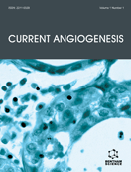Abstract
Epithelial ovarian cancer (EOC) is the leading cause of death from gynecologic malignancies in developed countries. Despite advances in chemotherapy leading to improved outcomes in EOC, mortality rates have marginally decreased, because most patients will develop resistance to standard chemotherapy. New anti-tumor agents with novel mechanisms of action are needed. Angiogenesis is one of the regulated processes that are crucial for tumor growth, invasion, and metastasis. Preclinical studies demonstrated an effect of anti-angiogenesis drugs on ovarian cancer models, which led to the development of various classes of anti-angiogenic drugs against VEGF, platelet derived growth factor (PDGF), angiopoietin, and fibroblast growth factor (FGF) signaling pathways. The vascular endothelial growth factor (VEGF) and its associated receptors have emerged as major therapeutic targets. Bevacizumab, a recombinant humanized monoclonal antibody targeting VEGF, has been studied in randomized trials and has shown activity in patients with platinum-sensitive and -resistant EOC. This article will provide an overview of the basic research and translational research mechanisms focusing on angiogenesis in EOC, review the current clinical trials, and perform a pooled analysis for determining the impact of anti-angiogenesis on this disease.
Keywords: Angiogenesis, clinical studies, ovarian cancer.
 15
15

